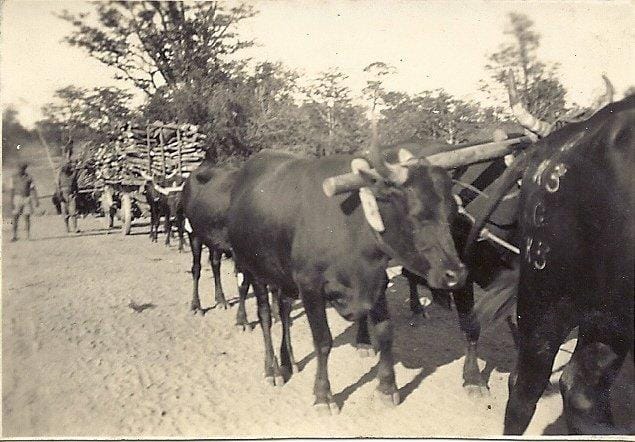Making a Fast Buck by Ox Wagon

Gervas Hughes’ ox wagon inward bound with a load of firewood on the Gokwe Road, 1929. N.B. Gervas’ brand GK3 and the Rhodesian yoke
Making a Fast Buck by Ox Wagon
For the third time in seven years Gervas Hughes arrived back in Que Que in 1928 having recovered from polio. The first time his father fetched him home to England under protest when his crops washed away in a flood, the second time his father rescued him when he was stricken with polio. Gervas wanted to see if he could make it on his own.
Making a Fast Buck by Ox Wagon
On his return he stayed with his friend, Arthur Ackerman, at his farm East Clare. His shoulder muscles had not recovered which restricted movement in both arms. He needed to determine if looking after himself and working was possible. He signed on for two months with Mr. R.W. Taylor who owned a transport business in Gatooma. Gervas drove the ‘Royal Mail’, to Eiffel Flats and back in a one ton model T Ford for him.
Soon Gervas had his own mealie milling and transport business, based at his industrial site on which he built an oblong brick building. (“Don’t tell the city fathers, but the bricks are laid in dagga.”) This served as his office, stable and home when he was in town until he built the Greenham farm house in 1936. In one corner a concrete slab was poured to mount the first hammer-mill in Que Que driven by a crude oil fuelled engine. Gervas claimed to be an ‘honest miller’. ” Tradition has it that millers have a hair growing in the middle of the palm of their hand.” He was no exception. Dealing in native maize and making full use of the loopholes in the Maize Control Act (later stopped) he soon had a thriving business.
The first town vehicle Gervas owned was a spring-less trolley, drawn by six oxen. With it he moved bags of flour, furniture, and crates of bicycle parts to stores and houses in the town, even large boxes of Tate’s cubed sugar for Mr. Wragg the chemist to make his syrups, from the railway station. Gervas transported sand from Dutchman’s Pool for Henshaw and Lowe the builders, plus bricks and cement to their building sites. Henshaw was a large man, an excellent brick-layer, with only one eye who put the first granolithic floor in the English Church. Lowe, had done his apprenticeship in the ship building yards of northern England, on passenger liner interior decoration.
There were very few full time farmers in the vicinity of Que Que, and Gervas, who wanted to be a farmer, transported their produce. Mr. Forrester at Forest Vale, on the Bembezaan, grew crops, but chiefly depended on selling firewood in town. West of Que Que tobacco was first grown at Gabari by the Elsworth brothers. Mears at Scumbula grew maize, and in the north Sherwood Park mine had a farm manager growing maize on red soil. J.J. Conway, an Irishman, with a passion for horses grew crops at Erin, and Gervas purchased several foals sired by his high class imported stallion. The Cam and Motor mine wood supply contract was his, Mr. Webb being his farm manager. Mr. Cunningham, at Basildon, was the only other man in the area who grew crops, including cotton. At Hunters Road the Hurrells and Watkinsons and “Long” Campbell grew maize, but that was hardly Que Que, except that Gervas did the transport.
Maize was 4/6 a bag. Cows with calves at foot sold for 27/6. Good young oxen were 30/- each. Meat was cheap, he sold it to the G&P for their workers, at 8/- per 100 lbs. Ackerman, when he was at East Clare, was one of the first farmers to grow crops to the east; he also sold vegetables and had a railway contract at 1d per lb. He sold eggs, all of which were stamped East Clare. He had a contract with Meikles Hotel, in Salisbury.
When attending the the Salisbury agricultural show, Gervas, being an English gentleman, and knowing that Meikles, the best hotel in Salisbury, would only employ English speaking waiters asked as he sat down to breakfast, “Are these eggs from East Clare?”
“No sir, these are FRESH eggs!” came the reply in perfect English from the white starched, red fezzed waiter.
Many Thanks to Tim Hughes of Queensland, Australia for the story excerpt from his unpublished manuscript Matambega and Son and the picture.
